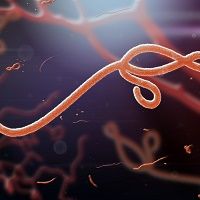Inhalable Vaccine Protects Primates Against Ebola
Researchers have developed an effective Ebola vaccine that does not require a syringe or even trained health care workers.

Researchers have developed an effective Ebola vaccine that does not require a syringe or even trained health care workers.
Previous research indicated that an individual can become infected with Ebola through the mucus membranes that line the respiratory tract. Therefore, it was hypothesized that the airway linings could not only play a pivotal role in virus entry, but also potentially provide a pathway for delivering a vaccine. Lead author Michelle Meyer, PhD, and colleagues from The University of Texas Medical Branch (UTMB) described the efficiency of the inhalable HPIV3/EboGP vaccine in The Journal of Clinical Investigation.
“This study demonstrates successful aerosol vaccination against a viral hemorrhagic fever for the first time,” senior author Alex Bukreyev, a virologist and UTMB professor, said in a news release.
The team conducted 2 studies on nonhuman primates to analyze the body’s responses to the vaccine as well as its ability to protect against Ebola in both aerosol and liquid forms. The vaccines proved to provoke CD8+ and CD4+ T cell responses, especially in the lungs although they were also present in the blood and spleen.
“A needle-free, inhalable vaccine against Ebola presents certain advantages. Immunization will not require trained medical personnel,” said Meyer, a UTMB postdoctoral fellow in the department of pathology.
One dose of the vaccine in both forms produced Ebola-neutralizing antibodies. A second dose did not show any more protection which indicates that a single dose may be sufficient.
“A single-dose aerosol vaccine would enable both prevention and containment of Ebola infections, in a natural outbreak setting where healthcare infrastructure is lacking or during bioterrorism and biological warfare scenarios,” Bukreyev said.
The next step in the research is to move to a National Institutes of Health phase I clinical study and then continue the evaluation in humans.